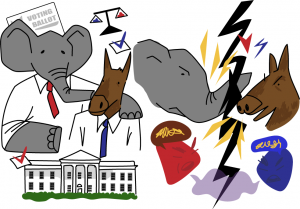Political Parties Are Critical Aspects of Modern Government
November 24, 2020
In an age marked by growing change and, in consequence, growing disputes, polarization has marred the United States’ political landscape, inspiring reform to deeply-rooted aspects of our government.
We must not, however, lose sight of the vital services that our country’s political parties provide for the government. Political parties are not only fundamental aspects of modern governance, but also manifestations of the free thought that we Americans so fortunately embody.
According to the Library of Congress, the United States sustains a multi-party system, featuring the Democratic and Republican parties along with smaller factions like the Libertarian, Socialist, Natural Law, Reform, Constitution and Green parties. Political parties emerged amid the ratification of the United States Constitution in 1787, and today they are deeply entrenched in governmental processes – most notably, elections.
Political parties are chiefly responsible for holding primary elections and conventions, which determine whom to nominate for subsequent general elections. Over 90 state primaries took place nationwide for 1,212 total registered political candidates before the November 2020 elections, according to the National Conference of State Legislatures.
Ultimately, political parties streamline our country’s intricate election process, enabling a simplified and coherent voting system for Americans.
“The common voter won’t spend as much effort and time to learn about each individual candidate as if they were all independents,” alumnus Nicholas Hung, who voted in the 2020 election, said. “The political party system helps voters quickly know the general summary of someone’s ideologies and what they would do in office.”
Opposing parties also have the ability to challenge each other during legislative processes, preventing a majority party from overshadowing the minority. Detractors may construe this authority as “partisanship;” however, this ability fundamentally upholds our government’s system of checks and balances, leveling the playing field for Democrats and Republicans alike.
Opponents often cite former President George Washington’s 1796 Farewell Address, a denunciation of political factions for their divisive and overpowering qualities.
“[Political parties] are likely in the course of time and things, to become potent engines, by which cunning, ambitious, and unprincipled men will be enabled to subvert the power of the people and to usurp for themselves the reins of government, destroying afterwards the very engines which have lifted them to unjust dominion,” Washington said in the address.
However, this argument disregards our country’s checks and balances system and the service of our government’s judicial branch in interpreting federal disputes: one that has upheld the integrity of American politics since the Constitution’s signing two centuries ago.
“Our political system and our political parties are a mirror for the electorate,” social studies department chair Jon Resendez said. “I don’t think it’s the parties that pull people apart. I think that the parties more accurately represent what the people are.”
Attributing today’s political polarization to the nature of political parties is unwarranted, especially considering their valuable role in streamlining legislative processes for the everyday citizen. And while they may appear as independently-acting entities, political parties, in the end, are based on the ideologies of our diverse population.
Alternatively, we must deconstruct the echo-chamber mindset among American voters, which is catalyzed by social media and the coercive mainstream media. Rather than blithely follow ideologies per their political labels, we need to embody our own beliefs and simultaneously be willing to acknowledge the rationale of conflicting ideals.
“It’s a balance between having an organized and efficient political system that people can understand and access, and then, on the other hand, having everyone be a rational, reasonable, free-thinking individual,” Resendez said. “A party of your own.”




